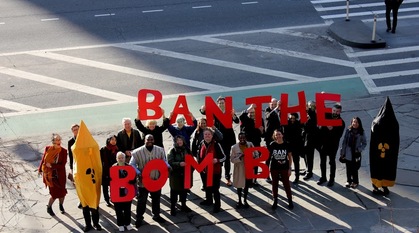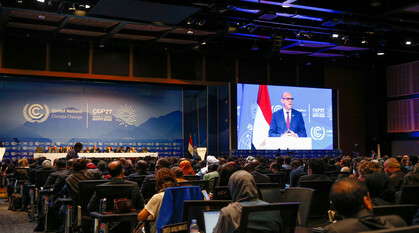European Parliament elections: our chance to steady Europe’s course
In the run-up to the European Parliament elections, Martin Leng explores how the Quaker Council for European Affairs is supporting people to tackle anti-migrant hate speech together.

It's one of the ironies of Brexit that the UK had to be on the brink of leaving the EU in order to start getting excited about European elections. Barring a sudden reversal of fortunes for the Prime Minister's Brexit agreement, British voters will head to the polls with the rest of Europe in May – if only to elect placeholder parliamentarians who will keep the seats warm in Brussels until Brexit eventually happens.
The vote is being seen by many as a proxy referendum on the UK's withdrawal, and looks set to arouse more political passion than the previous forty years of European elections combined. And this, two months after Britain was originally meant to leave the EU.
A shift in European politics
Polling suggests that up to a third of seats in the European Parliament may be won by populists and nationalists this May, which would mark a significant shift in the balance of European politics. In such a scenario, vital decisions on migration and climate policy could be in the hands of political parties who deny the reality of climate change and rely on anti-migrant hysteria to get elected. At best, their obstructionism could paralyse EU policymaking for five years. At worst, they could seek to turn back the clock on the hard-won human and environmental progress we should all seek to defend.
Be they Italian, Polish, French or British, the far-right populists' intentions are clear: razor-wire along Europe's borders and a punishingly tough pan-EU migration regime. In human terms, this means migrants and refugees forced into the hands of people smugglers, pushed back into overcrowded rafts to face the dangerous Mediterranean crossing. Harsher policies implemented at the national level have already led to a huge spike in the proportion of people drowning as they attempt to reach Europe in 2018. The goal now is to consolidate this new, harsh reality at the EU level – backed up by huge increases in security spending in the next European budget.
A Europe of bridges or a Europe of walls?
This is why the European Parliament elections in May are so important – even in the UK. British MEPs look set to occupy their seats until at least October, and maybe even longer if Brexit continues to be delayed. If the UK eventually revokes Article 50 and decides to remain an EU member state, the 73 representatives to be chosen in less than a month will be the UK voices in European politics until 2024. Their votes could be the difference between a Europe of bridges and a Europe of walls.
Countering hate with love
In Brussels, the Quaker Council for European Affairs (QCEA) is working to help Europe's voters do just that. Our human rights programme has launched an online campaign called #ChooseRespect, which aims to equip people across the EU with facts about migrants and refugees, as well as provide tips on how to have more positive conversations about migration.
QCEA is also using Twitter to spot instances of xenophobia and fear-mongering by MEPs and parliamentary candidates. We're replying to their tweets with messages to offer an alternative, more humane perspective to their supporters and followers.
We are countering hate with love, and challenging misinformation with fact. If we can all reach one person in this way, we can turn the populist tide in May. So far #ChooseRespect has reached over 300,000 people. With your support we can achieve even more: help us spread the word on Twitter @ChooseRespectEU, and use our resources to talk to friends and family about the elections.
Wherever you'll be voting in May, and whatever happens with Brexit, policies affecting many Quaker concerns will continue to be made in Brussels. The European Parliament elections are our opportunity as engaged citizens to make our voices heard. Let's get informed, reclaim a humane vision of Europe and #ChooseRespect at the ballot box. Influence like this doesn't last forever.
How do I vote?
The European elections will be held between 23-26 May, and the day you go to vote depends on where you live in the EU. You may also have to register. You can find out more at www.european-elections.eu.
In the UK, the vote will be held on Thursday 23 May and you must register by 7 May. Citizens of an EU country (other than the UK, Ireland, Malta or Cyprus) resident in the UK, can either vote in the UK or in their home country. You can find details about specific registration requirements: www.gov.uk/elections-in-the-uk/european-parliament.
The Quaker Council for European Affairs works to bring a vision based on the Quaker values of peace, justice and equality to Europe and its institutions. For more information visit www.qcea.org.


